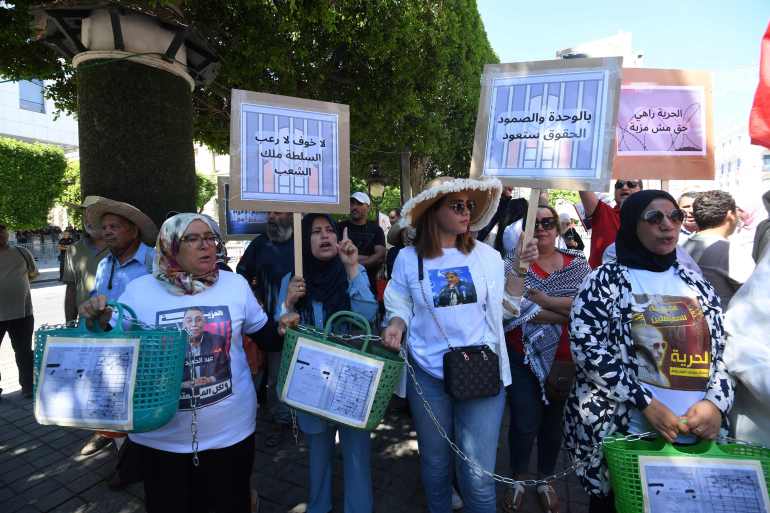Tunisia's presidential elections: rivals behind bars, Saied says he is waging war | News
A Tunisian court has sentenced four potential presidential candidates to eight months in prison and banned them from running for life, in a move they say is aimed at “excluding new competitors” for President Kais Saied, who has run for office as a “war of national liberation.”
The four potential candidates are accused of “buying endorsements,” and those sentenced are: prominent politician Abdel Latif Al-Makki, activist Nizar Al-Shaari, judge Murad Masoudi, and candidate Adel Al-Daw.
The ruling, issued yesterday, Monday, before the deadline for submitting nominations today, Tuesday, has exacerbated the concerns of opposition parties, candidates and rights groups who have accused the authorities of using “arbitrary restrictions” and “intimidation to pave the way for Saied's re-election.”
While activist Nizar Al-Shaari considered the ruling “shocking and aimed at keeping us out of the race,” Ahmed Al-Nafati, Al-Maki’s campaign manager, said that his campaign “will move forward with the decision to submit Al-Maki’s candidacy file,” considering the ruling “unfair and aimed at excluding a serious competitor from the race, and this will not prevent us from submitting his candidacy file tomorrow.”
Narrowing
Earlier on Monday, four prominent potential candidates, including Munther al-Zunaidi and Kamal al-Akrout, said authorities had informed them that they were being denied a criminal record card, a new requirement required by the election commission.
They accused the authorities of “reinstating dictatorship and holding farcical elections as was the case before the Tunisian revolution in 2011.”
In response to criticism of the restrictions on candidates and their inability to collect endorsement signatures, the Tunisian president said, “I did not restrict anyone, and the law applies to everyone equally. I am here as a citizen to submit my candidacy, and whoever talks about restrictions is delusional.”
Last month, a judge sentenced Lotfi Mraihi, a potential presidential candidate and fierce critic of Saied, to eight months in prison on charges of vote-buying and banned him from running in the presidential election.
Yesterday evening, a Tunisian court issued a two-year prison sentence against former MP Abir Moussi (49 years old) for criticizing the performance of the Independent High Authority for Elections in early 2023. The court issued its ruling in accordance with “Decree 54” issued by President Saied in 2022 to combat “fake news.”
If this conviction is upheld by the appeals court or at the end of other legal proceedings, she will be formally disqualified from the elections, as a candidate must have a clean criminal record. Moussi faces other serious charges, including “attack with intent to change the state's authority.”

Happy war
Yesterday morning, Kais Saied submitted his candidacy for the presidential elections, saying that “volunteers have collected more than 240,000 endorsements,” considering that renewing his candidacy for a second term after winning the presidential elections in 2019 falls within the framework of a “national liberation war.”
Saeed (66 years old) added in a media statement, “It is a war of liberation that we are waging and have started, and a war of self-determination that we are waging and a revolution until victory within the framework of popular legitimacy, and we will be victorious in order to establish a new republic, and we will not accept any foreign party interfering in the choices of our people.
The process of accepting nomination files began on July 29, and will continue until Tuesday. The Commission will submit a list of names whose nominations have been initially accepted by the end of this week.
The head of the Independent High Authority for Elections, Farouk Bouasker, said on Sunday that the nominations submitted to the authority “lack some conditions, and the authority’s council will hold a meeting on August 11 to announce the list of candidates whose files were initially accepted.”
It is noteworthy that Kais Saied was elected in 2019, dissolved parliament in 2021 and began ruling by decree, in a move described by the opposition as a “coup”, but he stressed that he would not hand over power to those he called “unpatriotic.
Opposition parties, many of whose leaders are in prison, accuse Saied's government of pressuring the judiciary to suppress his rivals in the 2024 elections and pave the way for him to win a second term.
Experts believe that the road to the presidential elections in Tunisia is full of obstacles for potential competitors to the president who was democratically elected in 2019 and who took power three years ago and is seeking a second term.
They point out that the criteria for accepting nominations are strict, with the requirement to secure endorsements from 10 parliamentarians, 40 elected local officials, or 10,000 voters, with the need to secure at least 500 endorsements in each electoral district, which is difficult to achieve.
The Commission also requires that the candidate obtain what is known as “Card No. 3,” a document proving the person’s criminal record and issued by the Ministry of Interior. Many candidates complained about not being able to obtain it.
Competitors behind bars
Behind bars are other opposition figures such as Issam Chebbi and Ghazi Chaouachi, who are accused of conspiring against state security. They announced their intention to run for president, but backed down because they were not allowed to appoint a personal representative to submit their candidacy file.
Many Tunisian and international human rights organizations have criticized the “decline in freedoms” in Tunisia. About 30 Tunisian human rights organizations denounced in a joint statement “the transformation of the electoral commission into a tool of deterrence, intimidation and threats of legal prosecution for anyone who criticizes its performance and bias, which has deprived it of independence and made it a tool of the existing authority with the aim of eliminating its opponents and silencing its opponents.”
